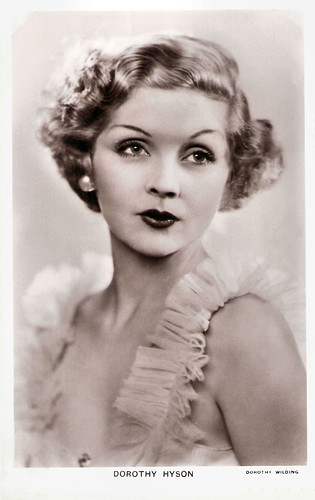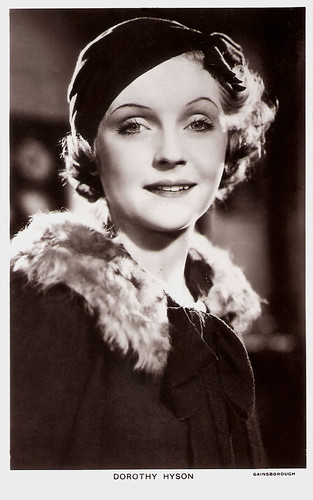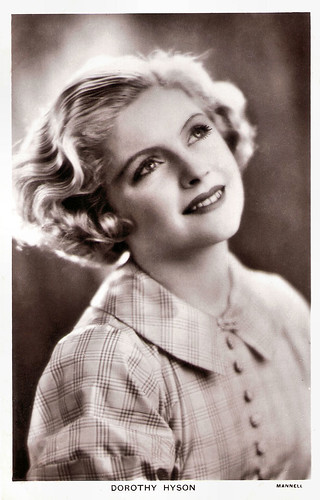American actress Dorothy Hyson (1914-1996) led a successful stage and film career in London. Noted for her great beauty and striking looks, the songwriters Rogers and Hart dedicated their song, 'The Most Beautiful Girl in the World', to her. She was a byword for theatrical West End glamour but also worked as a cryptographer for the Secret Service during the war.

British postcard in the Picturegoer Series, London, no. 785a. Photo: Dorothy Wilding.
Dorothy Hyson was born Dorothy Wardell Heisen in Chicago, Illinois, in 1914. She was the daughter of adorable Dorothy Dickson, the toast of Broadway and her husband, Carl Hyson, celebrated exponent of ballroom dancing in an era when it was all the rage. As a child, young Dorothy appeared in the silent Hollywood film Paying the Piper (George Fitzmaurice, 1921) which starred her mother. That same year, the family moved to London where her parents went to work at the West End.
She made her London stage debut at the age of 12 at the Savoy Theatre in J.M. Barrie's 'Quality Street'. The following year, she acted in Daisy Ashford's 'The Young Visitors'. Leading critic James Agate wrote: "I think in Dorothy Hyson we may have the comedienne of the future".
In 1933, Ivor Novello, impressed by her charm and beauty, offered her the role of Gladys Cooper's daughter in his play, 'Flies in the Sun'. Later successes included Maxwell Anderson's comedy, 'Saturday's Children' and 'Touch Wood', in which she co-starred with Flora Robson.
She made her film debut in the British historical comedy Soldiers of the King (Maurice Elvey, 1933) starring Cicely Courtneidge. Then she co-starred in the British horror film The Ghoul (T. Hayes Hunter, 1933), starring Boris Karloff, Cedric Hardwicke, Ernest Thesiger, and Ralph Richardson, making his film debut. An Egyptologist (Karloff of course) returns from the dead to take revenge on those who have violated his tomb. The film was popular in the UK but performed disappointingly in the US. Subsequently, it disappeared and was considered to be a lost film over the next 31 years.
Hyson also appeared in British films like the musical That's a Good Girl (Jack Buchanan, 1933), the Aldwych farce Turkey Time (Tom Walls, 1933) starring Tom Walls and Ralph Lynn, and the musical Sing As We Go (Basil Dean, 1934) starring Gracie Fields. However, acting in films by day and on stage at night brought on a nervous breakdown. She brought her film career to a temporary halt. In 1935, she appeared at the West End in the play, 'The Ringmaster', with Laurence Olivier. At the age of 20, she married the British film actor Robert Douglas.

British postcard in the Picturegoer Series, London, no. 785. Photo: Gainsborough.

British postcard in the Picturegoer Series, London, no. 846. Photo: Mannell.
In 1940, Dorothy Hyson starred with George Formby in the film Spare a Copper (John Paddy Carstairs, 1940), a combination of musical comedy and war film. Formby plays a bumbling War Reservist police officer called George Carter who aspires to become a member of the flying squad. The film is set in Merseyside where the battleship HMS Hercules is being built. She also co-starred with Robert Morley in You Will Remember (Jack Raymond, 1941).
During World War II, Hyson worked as a cryptographer at the secret codebreaking establishment Bletchley Park. Though married to actor Robert Douglas at the time, she was visited there by actor and director Anthony Quayle and the two fell in love.
After the war, she returned to the West End. She joined John Gielgud’s Haymarket Company in 1945. Her final screen appearance was opposite Margaret Rutherford in the TV Movie The Importance of Being Earnest (1946) based on the play by Oscar Wilde.
After divorcing Douglas, she married Quayle in 1947. Then she soon retired from the stage to concentrate on bringing up their children. They had two daughters, actress Jenny Quayle and Rosanna Rosanna Astley-Quayle, and a son, designer Christopher Quayle. Hyson was a renowned hostess in London and numbered among her close friends, H.M. Queen Elizabeth II, Queen Elizabeth the Queen Mother, Noel Coward and John Gielgud.
Dorothy Hyson was widowed in 1989. She died from a stroke in England, in 1996, a year after the death of her mother, who died at age 102. Wikipedia writes that it is not known whether Hyson ever relinquished her American citizenship and/or became a British subject.
Dorothy Hyson sings 'Sun In My Eyes' in Turkey Time (1933). Source: gallerydreams (YouTube).
George Formby sings 'On The Beat' in Spare a Copper (1940). Source: mkcwebmaster (YouTube).
Sources: Adam Benedick (The Independent), Patrick Newley (IMDb), Dave Miller (Flickr - Page now defunct), Wikipedia and IMDb.
This post was last updated on 4 November 2024.

British postcard in the Picturegoer Series, London, no. 785a. Photo: Dorothy Wilding.
The comedienne of the future
Dorothy Hyson was born Dorothy Wardell Heisen in Chicago, Illinois, in 1914. She was the daughter of adorable Dorothy Dickson, the toast of Broadway and her husband, Carl Hyson, celebrated exponent of ballroom dancing in an era when it was all the rage. As a child, young Dorothy appeared in the silent Hollywood film Paying the Piper (George Fitzmaurice, 1921) which starred her mother. That same year, the family moved to London where her parents went to work at the West End.
She made her London stage debut at the age of 12 at the Savoy Theatre in J.M. Barrie's 'Quality Street'. The following year, she acted in Daisy Ashford's 'The Young Visitors'. Leading critic James Agate wrote: "I think in Dorothy Hyson we may have the comedienne of the future".
In 1933, Ivor Novello, impressed by her charm and beauty, offered her the role of Gladys Cooper's daughter in his play, 'Flies in the Sun'. Later successes included Maxwell Anderson's comedy, 'Saturday's Children' and 'Touch Wood', in which she co-starred with Flora Robson.
She made her film debut in the British historical comedy Soldiers of the King (Maurice Elvey, 1933) starring Cicely Courtneidge. Then she co-starred in the British horror film The Ghoul (T. Hayes Hunter, 1933), starring Boris Karloff, Cedric Hardwicke, Ernest Thesiger, and Ralph Richardson, making his film debut. An Egyptologist (Karloff of course) returns from the dead to take revenge on those who have violated his tomb. The film was popular in the UK but performed disappointingly in the US. Subsequently, it disappeared and was considered to be a lost film over the next 31 years.
Hyson also appeared in British films like the musical That's a Good Girl (Jack Buchanan, 1933), the Aldwych farce Turkey Time (Tom Walls, 1933) starring Tom Walls and Ralph Lynn, and the musical Sing As We Go (Basil Dean, 1934) starring Gracie Fields. However, acting in films by day and on stage at night brought on a nervous breakdown. She brought her film career to a temporary halt. In 1935, she appeared at the West End in the play, 'The Ringmaster', with Laurence Olivier. At the age of 20, she married the British film actor Robert Douglas.

British postcard in the Picturegoer Series, London, no. 785. Photo: Gainsborough.

British postcard in the Picturegoer Series, London, no. 846. Photo: Mannell.
Secret codebreaking
In 1940, Dorothy Hyson starred with George Formby in the film Spare a Copper (John Paddy Carstairs, 1940), a combination of musical comedy and war film. Formby plays a bumbling War Reservist police officer called George Carter who aspires to become a member of the flying squad. The film is set in Merseyside where the battleship HMS Hercules is being built. She also co-starred with Robert Morley in You Will Remember (Jack Raymond, 1941).
During World War II, Hyson worked as a cryptographer at the secret codebreaking establishment Bletchley Park. Though married to actor Robert Douglas at the time, she was visited there by actor and director Anthony Quayle and the two fell in love.
After the war, she returned to the West End. She joined John Gielgud’s Haymarket Company in 1945. Her final screen appearance was opposite Margaret Rutherford in the TV Movie The Importance of Being Earnest (1946) based on the play by Oscar Wilde.
After divorcing Douglas, she married Quayle in 1947. Then she soon retired from the stage to concentrate on bringing up their children. They had two daughters, actress Jenny Quayle and Rosanna Rosanna Astley-Quayle, and a son, designer Christopher Quayle. Hyson was a renowned hostess in London and numbered among her close friends, H.M. Queen Elizabeth II, Queen Elizabeth the Queen Mother, Noel Coward and John Gielgud.
Dorothy Hyson was widowed in 1989. She died from a stroke in England, in 1996, a year after the death of her mother, who died at age 102. Wikipedia writes that it is not known whether Hyson ever relinquished her American citizenship and/or became a British subject.
Dorothy Hyson sings 'Sun In My Eyes' in Turkey Time (1933). Source: gallerydreams (YouTube).
George Formby sings 'On The Beat' in Spare a Copper (1940). Source: mkcwebmaster (YouTube).
Sources: Adam Benedick (The Independent), Patrick Newley (IMDb), Dave Miller (Flickr - Page now defunct), Wikipedia and IMDb.
This post was last updated on 4 November 2024.
No comments:
Post a Comment